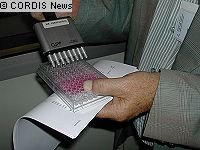Reduction and refinement of animal testing ahead of replacement, argues COST action
The COST Action 'Laboratory Animal Science and Welfare' has provided recommendations on alternatives to animal testing within the Seventh Framework Programme for research, FP7. The group would like to see all 'three Rs' - replacement, refinement and reduction - addressed in FP7, but would like to see more of a focus on refinement and reduction, which, the group believes, have been neglected up until now. 'Until now the 'Replacement' alternative has received far more attention and EU funding opportunities than the other two Rs - 'Reduction' and 'Refinement'. We suggest that all the three Rs should deserve equal weight and support in research funding,' states the position paper. ''Replacement' is not always possible and sometimes not even desirable. Therefore, more research on the remaining two Rs should be encouraged in order to improve welfare of the animals still being used, leading to better quality animals and to a 'Reduction' of the numbers used. Moreover, it may be that better science evolves from the application of the two Rs.' The criteria for refinement and reduction are that the methods are scientifically proven to have beneficial effects on animals, and at the same time have no impact on the results of a study. The need to address alternatives to animal testing has become urgent due to pressure from two sources, according to the paper: the general public, which wishes to see animal welfare improved; and scientists with increasing demands for quality and scientific validity within biomedical research. The Finnish institutions are also concerned that an increased EU research budget will 'inevitably mean more laboratory animals used in basic research' and therefore point to an 'acute and urgent need for funding of studies on how best to apply the two Rs methods'. 'There should be two arrowheads in the two Rs approach: we should focus on painful procedures and methods to alleviate them, but we should at the same time improve overall welfare of laboratory animals,' says Professor Timo Nevalainen from the University of Kuopio. 'The latter represents small steps with a large number of animals, while the number of animals exposed to painful procedures is far smaller. Both are likely to yield considerable refinement.'
Countries
Finland



